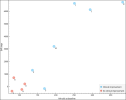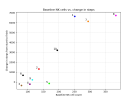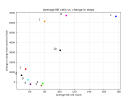“Protocol ver. 1.6: Amended treatment protocol; this will apply to four additional patients included in Q1 2025, as well as retreatment of one previously included patient with partial relapse. Patients will receive the first daratumumab subcutaneous injection at week 0. For patients with signs of clinical response after the first injection, a second injection will be given at 24 weeks, and a third injection at 48 weeks.
At week 10, if there are no signs of a clinical response, a second daratumumab injection will be given, and, subject to a clinical response, the third and fourth injection will be given at week 24 and 48. If patient experiences no response after the second injection, no further daratumumab will be given.”
Can be found here.
Search for clinical trials - EMA
@Jonathan Edwards does this amended protocol seem sensible to you?
If I recall correctly, you stated earlier (somewhere) that one initial dose of Daratumumab would be sufficient to deplete LLPCs. This protocol will only be given to several patients in the extended pilot project and it consists of only 3 injections at weeks 0, 24 and 48. For patients who don’t respond by week 10 an additional injection will be given then.



